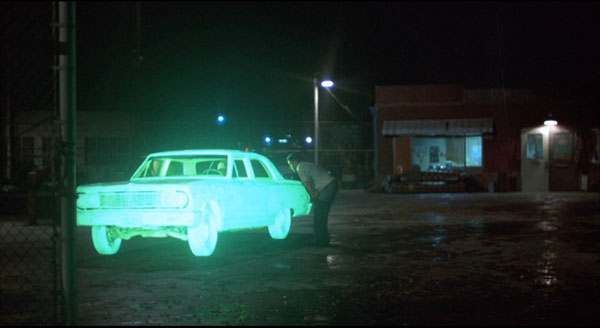“Pressed, it’s hard to think of five American studio pictures as original as Repo Man,” begins John Semley, awarding five out of five stars in Slant to Criterion’s release on DVD and Blu-ray. “The utter weirdness of Alex Cox‘s remarkable debut—a document of L.A.’s hardcore punk scene that’s also an ode to its car culture, a critique of the American middle class, and a kind-of sci-fi comedy about a radioactive Chevy Malibu—would seem to preclude its existence. And yet here it is. Nearly 30 years later, Repo Man is no worse for the wear. Not so much ahead of its time as outside of it, the film’s L.A. punk particularities have broadened over the years. Its ennui has endured not just as a portrait of a certain generation of angry adolescents, but as one of angry adolescence writ large.”
“Ever wondered what happened to that radioactive Pandora’s box that suddenly transformed Kiss Me Deadly (1955) from a terse, sordid, ultra-stylized little noir into batshit sci-fi apocalypse in the film’s final, unforgettable moments?” asks Josef Braun in Vue Weekly. “Turns out it wound up in the trunk of a 1964 Chevy Malibu, driven by a rather peculiar scientist (Fox Harris)—with only half a pair of sunglasses—some three decades later.” Repo Man “follows one Otto (Emilio Estevez), a blank slate of a punk-rocker from Huntington Beach who can’t get laid and can’t hold a stupid job long enough to save up any money, while his baby-boomer burnout parents give all the family savings to some caffeinated televangelist who insists that God wants their money.” Eventually, he finds “gainful employment legally stealing people’s cars and getting chased and attacked by angry drivers who neglect to make their payments. Otto likes the money and he likes the thrills. He even seems to like his mentor, Bud (Harry Dean Stanton), the senior agent who manages to recruit Otto without Otto’s knowing…. Stanton is the film’s enigmatic and weary center and key emblem, a figure of bizarre resilience in Reagan-era America. It remains one of this great character actor’s small handful of larger roles.”
Along with their “Three Reasons” and a clip of Iggy Pop explaining how Repo Man would become a turning point in his career, Criterion’s also posted two photo galleries (Jay Shaw‘s superbly designed packaging and Susan Arosteguy‘s “10 Things I Learned”) as well as Sam McPheeters‘s essay: “Even now, the film’s existence seems implausible. It is an apocalypse tale with no doomsday, a punk movie with no concert, a science fiction story with less than ten seconds of aliens. Most of its now classic music was on the far, far edge of American society in 1984. It mines a world of drugs, crime, and capitalist peril for absurdist yuks (when Cox showed the film to his contacts in the real world of Los Angeles auto repossession, they found it to be a diluted version of their much more terrifying jobs)…. How a major studio allowed such a vehemently odd movie to exist really is a mystery. Its outlandishness isn’t forced; it’s forceful.”
Artist Jay Shaw interviews Director/Writer Alex Cox from Tom DeFrancia on Vimeo.
Turns out, Jay Shaw’s not only a terrific designer, he’s an easy-going interviewer as well. Here, he gets Cox talking about how he managed to get the soundtrack past executive producer Michael Nesmith, tune by tune, and about his forthcoming adaptation of Harry Harrison’s 1965 rejoinder to Robert Heinlein’s Starship Troopers, Bill, the Galactic Hero.
“Repo Man is simply too loopy, too fresh, too unencumbered with dogma to qualify as a downward-spiral excursion into ennui,” writes Sheri Linden in the Los Angeles Times. “And it abounds in memorable lines, the more Zen among them delivered by Tracey Walter as Miller, a Helping Hand employee who apparently moonlights as a shaman (it’s L.A., after all). He’s well versed in the ‘lattice of coincidence’—a fine capsule description of the art of fiction and the serendipity of life. Even the movie’s bowdlerized TV version, supervised by Cox and a key component of the Criterion release, offers linguistic treats, with its generous use of such poetically awkward coinages as ‘flip you’ and the indelible ‘melon farmer.'” Repo Man “wasn’t the first feature to mash up science fiction, underground culture and cutting-edge music; Liquid Sky was a huge indie hit in 1982, but its more cerebral, synth-driven saga contrasts sharply with the rough-and-ready of Cox’s politically astute debut. And Liquid Sky was set in New York, a city then secure in its status as the center of the cultural universe. Cox’s film, in comparison, explores the edges of a metropolis that was in search of a center, a place where ‘the life of a repo man is always intense.'”
For news and tips throughout the day every day, follow @KeyframeDaily on Twitter and/or the RSS feed. Get Keyframe Daily in your inbox by signing in at fandor.com/daily.




